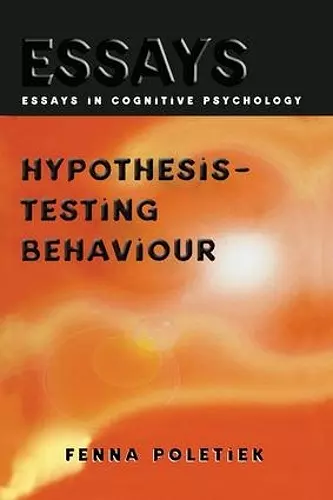Hypothesis-testing Behaviour
Format:Paperback
Publisher:Taylor & Francis Ltd
Published:25th Jun '15
Currently unavailable, and unfortunately no date known when it will be back
This paperback is available in another edition too:
- Hardback£39.99(9781841691596)

How do people search evidence for a hypothesis? A well documented answer in cognitive psychology is that they search for confirming evidence. However, the rational strategy is to try to falsify the hypothesis. This book critically evaluates this contradiction. Experimental research is discussed against the background of philosophical and formal theories of hypothesis testing with striking results: Falsificationism and verificationism - the two main rival philosophies of testing - come down to one and the same principle for concrete testing behaviour, eluding the contrast between rational falsification and confirmation bias. In this book, the author proposes a new perspective for describing hypothesis testing behaviour - the probability-value model - which unifies the contrasting views. According to this model, hypothesis testers pragmatically consider what evidence and how much evidence will convince them to reject or accept the hypothesis. They might either require highly probative evidence for its acceptance, at the risk of its rejection, or protect it against rejection and go for minor confirming observations. Interestingly, the model refines the classical opposition between rationality and pragmaticity because pragmatic considerations are a legitimate aspect of 'rational' hypothesis testing. Possible future research and applications of the ideas advanced are discussed, such as the modelling of expert hypothesis testing.
'Poletiek provides an extremely useful and up-to-date discussion of psychological theories of hypothesis testing. Not only does she cover a wide variety of approaches, but provides a very interesting commentary on the way that these approaches relate to the philosophies and formal theories discussed.' - Journal of Behavioural Decision Making
'Provides a synthetic analysis of philosophical, formal and psychological studies of hypothesis testing from the cognitive and decision sciences perspectives.' -Contemporary Psychology
'Poletiek's book is informative, impressive in scope, and original in its integration of traditional dichotomies. It makes a considerable contribution to both the philosophy and psychology of hypothesis testing. It offers, additionally, further opportunity to rethink traditional understandings of what it is for humans (and other beings?) to be rational in their everyday pursuits and how this might be most accurately modelled.' - Studies in the Philosophy of Science
'Dr Poletiek's monograph combines impressive scholarship with excellent new insights based on her own recent research and on innovative interpretations of prior work in philosophy and psychology. This will be an invaluable resource for anyone interested in understanding how people develop beliefs and theories.' - Joshua Klayman, University of Chicago, USA
'Poletiek provides an extremely useful and up-to-date discussion of psychological theories of hypothesis testing. Not only does she cover a wide variety of approaches, but provides a very interesting commentary on the way that these approaches relate to the philosophies and formal theories discussed.' - Journal of Behavioural Decision Making
'Poletiek's book is informative, impressive in scope, and original in its integration of traditional dichotomies. It makes a considerable contribution to both the philosophy and psychology of hypothesis testing. It offers, additionally, further opportunity to rethink traditional understandings of what it is for humans (and other beings?) to be rational in their everyday pursuits and how this might be most accurately modelled.' - Studies in the Philosophy of Science
ISBN: 9781138877382
Dimensions: unknown
Weight: 272g
182 pages